November 1, 2012
by Carole Zangari -
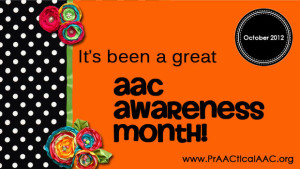
It’s hard to believe that AAC Awareness Month 2012 is over. We are happy to announce the winners of the final drawing. Diane Saunders (#160), Rachel Berry (#12), Claire Rubin (#73), Cassandra Stafford (#726), Carrie Walls (#609), Alison Rumball (#369), Monica Venezia (#309), Tanya Keller Scott (#414), Tea Moore (#393), Christina Frenzel (#179), Hudi Bernstein (#668), Yvette Bardole (#350), Lauren Enders (#241), Juliana Escobar (#500), Caroline Trzaska (#294), Kimberly Hurley (#488), Jane Eikelboom (#189), Amy Vinson Taylor (#771), Lisa Neely (#567), Stacey (#695), Debra Seixas (#451), and Melissa Seldin (#268). We will be in touch later today with the specifics. We are deeply appreciative of the AAC community who furnished the prizes we awarded to 70+ winners. A huge thank you to Ablenet, Inc, Abilipad, Alexicom, Avaz, BeeVisual, Dynavox/Mayer Johnson, Gail Van Tatenhove, PA, Hump Software, iClick iTalk, MarbleSoft, Mozzaz, News-2-You, Paul H. Brookes Publishing Company, RJ Cooper, Safe N... [Read More...]
Filed under: PrAACtical Thinking
Tagged With: AAC Awareness Month, Giveaway
October 30, 2012
by Carole Zangari -
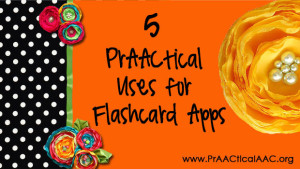
We love AAC intervention that begins and ends with a context that is meaningful to the learner. Not only is contextually relevant therapy more engaging and fun for the learner (thus, easier on the clinician!) but it promotes generalization to real-world contexts. So we’ve never been terribly fond of therapy that uses flash cards, or, more recently, the digital versions on iOS or Android devices. It’s a shame, really. There are a lot of those kinds of apps, and many of them have great graphics. That got us to starting thinking: What could we use them for that improves real communication and AAC learning? PrAACtical Uses for Flashcard Apps Make a Mini Schedule: Lots of people with AAC needs use paper-based picture schedules that depict the activities they do throughout the day. A flashcard app could be used in conjunction with those to show the steps or parts of an... [Read More...]
Filed under: PrAACtical Thinking
Tagged With: Apps, core language, flashcards, schedule, semantics, vocabulary
October 29, 2012
by Carole Zangari -
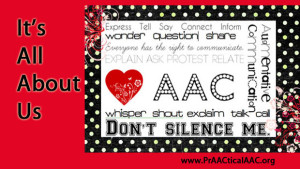
No one wants to be ‘that’ professional. You know him or her. The one who always sees the glass as half empty. The one who can give you a long list of things his/her clients can’t do, won’t be able to do. The one is quick to give a dozen reasons why the AAC tools and strategies won’t work for his/her clients. The one who repeatedly says “We tried that and it didn’t work.” I met a professional like this (haven’t we all??) at a workshop I was teaching on making AAC work in the classroom. She approached me at every break and was eager to talk. In these conversations she tried everything she could to get me to agree that her kids were “too low functioning,” that the AAC device was too high level for them, and that the parent’s expectations were unrealistic. What struck me about this young... [Read More...]
Filed under: PrAACtical Thinking
Tagged With: attitude, attitudinal barrier, Barriers, professional development, professionals, self-reflection
October 28, 2012
by Carole Zangari -

We mean well. We really do. But sometimes the things we say or do, and even the things we DON’T say/do have a negative impact on our long-range goal of improving AAC outcomes. Here are some of the things we’ve observed that can discourage AAC use. Recommending AAC without giving stakeholders a solid, evidence-based rationale creates a shaky foundation. People aren’t going to put forth effort to implement something they don’t believe in, and they won’t believe in it until we make a compelling, well-supported argument. ‘Rules that aren’t understood are the first to be broken.’ It’s easy to forget that, in some ways, the AAC user is learning a whole new language. What would it take US to learn a new language? Well, for starters, we’d want to be immersed into an environment with competent speakers of that language. Hearing the language that we’re trying to learn makes... [Read More...]
Filed under: PrAACtical Thinking
Tagged With: SLP
October 26, 2012
by Carole Zangari -
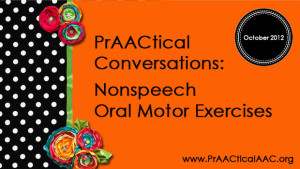
There are some good reasons to use nonspeech oral motor exercises, like blowing, puckering, tongue lateralization, and stretching. For a period of time, I used resistance exercises extensively with one client to improve the resting posture of his articulators and help him keep his mouth closed. Good for hygiene and to reduce his exposure to germs. Using these strategies, lots of children have gained strength and control that allowed them to better bite, chew, and swallow their food. Oral motor exercises can result in some meaningful gains. According to the research, however, improved speech articulation is not among them. There have been a number of studies on this approach, including some strong systematic reviews by McCauley and others. This summary by Dr. Greg Lof (Chair of the Department of Communication Sciences and Disorders at Massachusetts General Hospital Institute of Health Professions) is a few years old but is worth another... [Read More...]
Filed under: PrAACtical Thinking
Tagged With: controversy, EBP, evidence, nonspeech oral motor exercises, research, resources
October 25, 2012
by Robin Parker -
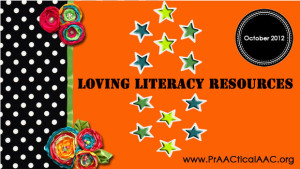
For AAC Awareness Month, we would be remiss if we did not think about literacy. It is a form of communication and language that supports AAC use. Sometimes literacy is difficult for our students, other times it is actually easier and it helps conversational communication and even natural speech. Either way, reading, writing, talking, and listening (understanding) are all modalities of language. There are so many great resource lists for supporting literacy: Jane Farrall’s Letter of the Week: Resources for Older Students, Spectronics Apps for Literacy Support, Melissa Taylor’s 24 Educational iPad Apps for Kids in Reading and Writing, and 25 Great Children’s Apps to Stimulate Literacy, Learning, & Creativity just to name a few. We wanted to share a few additional resources for literacy with general education apps that approach reading through fun with words. And any literacy discussion could not be complete without some seriously great literacy information, theory, and supports... [Read More...]
Filed under: PrAACtical Thinking
Tagged With: literacy, reading, talking, understanding, writing
October 24, 2012
by Carole Zangari -
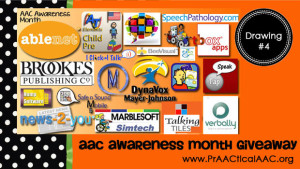
It’s been an exciting AAC Awareness Month! There were 25 lucky winners in the first two drawings and earlier today we drew the names for the third round. The winners for Drawing # 3 are Tanya Keller Scott (#473), Rachel Berry (#266), Carrie Walls (#9), Felicia Moore (#566), Diane Saunders (#34), Jillian Mayo (#164), Juliana Escobar (#425), Amy Vinson Taylor (#138), Allyssa Lucas (#323), Katrina Stebbins (#88), Kristina Frenzel (#480), Jennifer Schroeder (#510), Christine Cobb (#587), Lauren Enders (#53), Mark Neely (#291), Cassie Cann (#213), Amy M (#182), Cassandra Stafford (#366), Monica Venezia (#547), Lizzie Feldman (#579), Melissa Nicole (#364), Erin Finnegan (#434), and Kia Hughes (#383). Congratulations to the winners! Our 4th and final drawing promises to be the best one yet. Please join us in giving virtual round of applause to these generous companies: Ablenet, Inc Abilipad Alexicom Avaz BeeVisual Dynavox/Mayer Johnson Gail Van Tatenhove, PA Hump Software iClick iTalk MarbleSoft Mozzaz News-2-You Patient Provider Communication Paul H. Brookes Publishing Company RJ Cooper Safe N Sound Mobile Say It with Symbols... [Read More...]
Filed under: PrAACtical Thinking
October 23, 2012
by Carole Zangari -
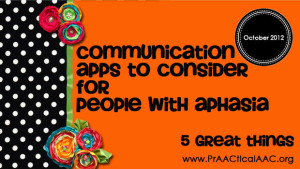
It’s hard for most of us to imagine the experience of having had language all your life and suddenly losing it. Here are some ideas for apps that may be useful in your therapy with people with aphasia. Scene and Heard from tBox Apps and Scene Speak from Good Karma Apps: We’d love to see more people with significant language deficits use visual scene displays to communicate. Lingraphica’s Small Talk Series and their TalkPath apps: Worth exploring these apps as they were designed expressly for this clinical population. Tactus Language TherAPPy apps: Looking for apps that will help your patient develop and practice language and writing skills? Tactus has several to explore. Pictello from AssistiveWare: There is great power in storytelling and one of the things missed most by people with acquired communication disorders is their ability to connect with friends and family. This app has great potential for sharing... [Read More...]
Filed under: PrAACtical Thinking
Tagged With: aphasia, Apps, Emergency, narrative, stroke
October 20, 2012
by Robin Parker -
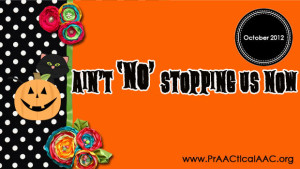
Sometimes saying ‘no’ to the demands of the day actually helps us rejuvenate and allows us to be more productive. Saying ‘no to false information helps us to advocate for ourselves. The ‘no’ topic seems to be trending now. There have been quite a few blog posts and comments about the issue (Just Say No, How and When to Give Your Students A Break). We are so glad that this topic is getting more focus. Of course everyone agrees that ALL people have the right to say ‘no’. But it is not always so simple. There are many types of ‘no’. There is the outright ‘no’, the ‘no’ to more work, the ‘no’ for disagreement, the ultra important ‘NO’ to unwanted touching, and many more. And depending upon how you say ‘no’ is the difference between it being accepted or… NOT. The issue of saying ‘no’ gets more complicated when... [Read More...]
Filed under: PrAACtical Thinking
Tagged With: breaks, communication, protesting, saying 'no'
October 19, 2012
by Carole Zangari -
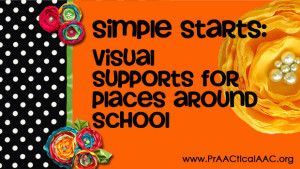
Simple Start is a series of posts that discuss AAC-related tools and strategies that are rather quick and easy to make or implement. Whether you are brand new to AAC or relatively experienced, we all come to a point where complicated just won’t do. – In our first Simple Start, we’re talking about Picture Card Rings, a type of visual support for language comprehension. The National Professional Development Center on Autism Spectrum Disorders defines visual supports as any tool presented visually that can help a person function in their day-to-day life. In this case, we’ve narrowed it down to the specific case of using photos of places around a school to help the student better understand words like ‘cafeteria’ and ‘clinic.’ — Most people with AAC needs do not require a communication system that represents language through photographs. This is a very good thing since there is no way to... [Read More...]
Filed under: PrAACtical Thinking
Tagged With: implementation ideas, photograph, PowerPoint, resources, Simple Start, visual support









